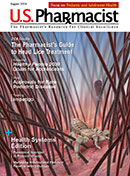Recently, researchers explored the efficacy and safety of guselkumab, an anti-interleukin-23p19-subunit antibody, in patients with PsA with prior IR to TNFis.
The study was published in the journal Annals of Rheumatic Disease. The researchers evaluated the efficacy and safety of guselkumab in patients who had previously taken TNFis but discontinued use due to of inefficacy or intolerance by conducting a randomized, double-blind study called COSMOS at 84 European sites from March 2019 to November 2020. The study included a 6-week screening period and placebo-controlled (Weeks 0 to 24) and active-treatment (Weeks 24 to 48; final study intervention at Week 44) periods. The primary endpoint assessment was at Week 24, with final efficacy and safety evaluations at Weeks 48 and 56, respectively.
The study's 285 patients—52% of whom were women, with an average overall age of 49 years—were assigned to two groups: guselkumab (n = 189) or placebo (n = 96). A total of 88% of all patients had used one TNFi prior; 12% had used two. Adults with active PsA (> 3 swollen and > 3 tender joints) who discontinued <2 TNFi due to IR (lack of efficacy or intolerance) were randomized (2:1) to subcutaneous guselkumab 100 mg or placebo at Weeks 0 and 4, then every 8 Weeks through Week 44. Patients receiving placebo crossed over to guselkumab at Week 24.
At Week 24, the primary American College of Rheumatology criteria (ACR20) and key secondary endpoints change in Health Assessment Questionnaire-Disability Index (HAQ-DI), ACR50, change in 36-item Short-Form Health Survey (SF-36) physical and mental component summary (PCS), and Psoriasis Area and Severity Index (PASI100) endpoints underwent fixed-sequence testing (two-sided α = 0.05). Adverse events (AEs) were evaluated through Week 56.
The authors indicated that among 285 participants, 88% of patients in the guselkumab arm and 83% of the placebo arm completed the study. At 24 weeks, a statistically significantly greater percentage of patients receiving guselkumab (44.4%) than placebo (19.8%) achieved ACR20 (% difference [95% CI]: 24.6 [14.1-35.2]; multiplicity-adjusted P <.001).
They also revealed that guselkumab was superior to placebo for each key secondary endpoint (multiplicity-adjusted P <.01). ACR20 response (nonresponder imputation) in the guselkumab group was 58% at Week 48; >80% of Week 24 responders maintained response at Week 48. Through Week 24, serious AEs/serious infections occurred in 3.7%/0.5% of 189 guselkumab-randomized and 3.1%/0% of 96 placebo-randomized patients, and the safety profile of guselkumab was comparable through Week 56 with no deaths or opportunistic infections. The authors concluded that guselkumab significantly improved joint and skin manifestations and physical function in patients with TNFi-IR PsA, and a favorable benefit-risk profile was demonstrated through 1 year.
The authors noted that limitations of the study included imbalances in baseline characteristics, such as gender and weight, as well as potentially limiting diversity due to the COSMOS study being restricted to European patients. In addition, they indicated that while the COVID-19 pandemic may have heightened major protocol deviations near the end of the study and that "...most were related to timing of study visits and did not impact efficacy."
The content contained in this article is for informational purposes only. The content is not intended to be a substitute for professional advice. Reliance on any information provided in this article is solely at your own risk.
« Click here to return to Dermatology Update.
Published December 15, 2021





